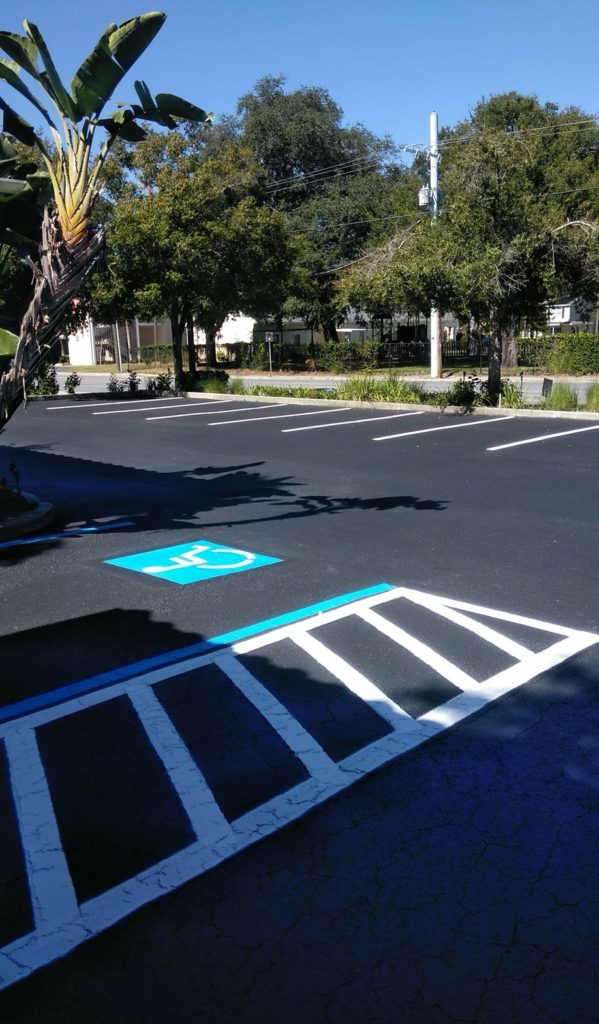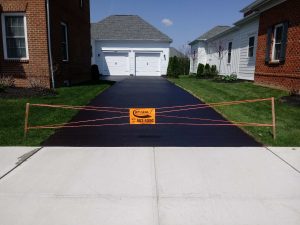Seal in Quality: Expert Solutions for Asphalt Repair and Sealing
Cold Mix Asphalt Vs. Hot Mix Asphalt: Which Is Right for You?

Make-up Distinctions
Cold mix and warm mix asphalts vary considerably in their composition, with distinctive characteristics that influence their efficiency and applications. Cold mix asphalt is created by emulsifying the asphalt binder with water and an emulsifying representative before blending it with accumulation. This approach allows for the asphalt to be convenient at lower temperature levels, making it ideal for short-lived repairs and for use in cooler weather. Hot mix asphalt, on the other hand, is produced at heats, typically in between 300-350 ° F, which aids to accomplish far better compaction and an extra durable end product. The hot mix asphalt production process includes heating up the accumulation and asphalt binder independently prior to incorporating them at the asphalt plant.
Moreover, chilly mix asphalt often tends to be much less dense and much more versatile than hot mix asphalt. This flexibility makes it better suited for areas with greater degrees of motion, such as driveways or roads with rush hour. On the other hand, hot mix asphalt is known for its high toughness and resistance to rutting and splitting, making it a favored choice for highways and high-traffic roadways where durability is important.
Setup Process Differences
The process of setting up cool mix and warm mix asphalt shows notable variances in their needs and treatments. In comparison, hot mix asphalt necessitates a more intricate installation process. Due to the home heating requirements, hot mix asphalt installations are commonly carried out by experts with specialized devices, ensuring a much more structurally audio and irreversible outcome.
Resilience and Longevity Aspects
When thinking about asphalt options, sturdiness and longevity are vital elements to assess for lasting pavement performance. Warm mix asphalt (HMA) is known for its outstanding toughness and longevity.
In terms of longevity, HMA usually outshines CMA as a result of its remarkable strength and resistance properties. HMA pavements have a longer life span, requiring much less regular fixings and upkeep, which can translate to set you back savings over time. Furthermore, HMA pavements are extra conveniently customizable to satisfy particular job needs, further enhancing their toughness.
Price Factors To Consider
Thinking about the economic implications is an essential aspect when assessing the selection between hot mix asphalt (HMA) and chilly mix asphalt (CMA) for sidewalk tasks. While the preliminary expense of hot mix asphalt is normally greater than that of cold mix asphalt, HMA commonly gives a more cost-effective remedy in the lengthy run due to its superior longevity and durability.
Along with product costs, it's crucial to consider the costs related to installation and maintenance when comparing HMA and CMA. HMA normally calls for specific tools and knowledgeable labor for proper setup, which can influence overall job costs. Alternatively, CMA is much easier to deal with and can commonly be applied utilizing simpler strategies, possibly decreasing installation expenditures. Ultimately, the decision between HMA and CMA should consider not just the initial price however additionally the lasting monetary implications to figure out one of the most affordable option for the specific sidewalk job.
Environmental Influence Comparison
Comparison of the ecological influences in between warm mix asphalt (HMA) and cold mix asphalt (CMA) reveals distinct differences in sustainability methods. HMA production calls for heats, leading to enhanced energy intake and greenhouse gas discharges. The procedure likewise releases unstable natural substances (VOCs) and unsafe air pollutants (HAPs) right into the ambience. In comparison, CMA is generated look these up and used at reduced temperatures, lowering power usage and discharges substantially. The reduced production temperature levels of CMA cause decreased fuel usage and lower levels of carbon dioxide discharges, making it a more eco-friendly choice.
Furthermore, the usage of CMA commonly includes recycling existing asphalt sidewalk, promoting resource preservation and reducing the quantity of waste sent out to land fills. By opting for CMA over HMA, roadway building and construction tasks can contribute positively to ecological preservation initiatives.
Verdict
In verdict, the choice between chilly mix asphalt (CMA) and warm mix asphalt (HMA) depends on different factors such as structure, installation procedure, durability, longevity, expense, and environmental effect. angle parking. While CMA provides a cost-effective and fast remedy for small repair work, HMA guarantees superior resilience and durability for heavy web traffic locations. Think about these factors meticulously to establish which kind of asphalt is the ideal option for your paving requires

Considering the financial implications is an essential aspect when examining the selection between warm mix asphalt (HMA) and cool mix asphalt (CMA) for pavement projects. While the first cost of hot mix asphalt is commonly greater than that of chilly mix asphalt, HMA commonly supplies a much more economical solution in the long run due to its exceptional longevity and longevity. asphalt repair.Comparison of the environmental effects between warm mix asphalt (HMA) and cold mix asphalt (CMA) exposes unique differences in sustainability methods.In final thought, the selection in between cold mix asphalt (CMA) and hot mix asphalt (HMA) depends on various aspects such as make-up, setup procedure, resilience, long life, cost, and environmental effect